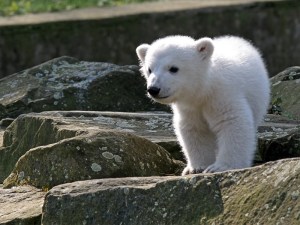Wikipedia editor María Atilano (User:Yllosubmarine) has always been fascinated by bears. In fact, one of the reasons she first got seriously involved with Wikipedia was because of a particularly white fluffy one.

In March 2007, Knut the polar bear — who was born and raised in captivity at the Berlin Zoological Garden — became the subject of international controversy when an animal rights activist suggested that it would be better to let Knut die rather than let him be raised by humans.
Atilano had been following the controversy, reading the news stories and even setting up a Google Alert for Knut. On Wikipedia, she noticed that “the article became really popular and it became decreasingly encyclopedic,” she said. Over several months, she worked to clean up the article to Good Article status, then nominated it for Featured Article status. This was Atilano’s first experience with the FA process, but eventually the article got promoted and became the Today’s Featured Article on the home page of English Wikipedia.
Poor Knut didn’t do well with all the traffic, said Atilano, as vandals were on a mission to mess with the article. “Periodically throughout the day, somebody would go in and change all the instances in the article from ‘polar bear’ to ‘polar dog.’ And somebody would revert them, and then they’d add it again, and they’d revert and then they’d add it again,” said Atilano. “I found out later on that there was this whole conspiracy. It was the weirdest thing!”
Since the Knut incident, Atilano has created and made major contributions to dozens more articles, all with the same level of devotion and attachment. “I’m one of those obsessive hands-on editors,” she said. “Whenever an article that I created–or not just written, but maybe I helped copy edit it or something–whenever that’s on the main page, I tend to stay glued to the monitor and refresh, refresh, refresh and see what people are doing to my babies.”
Knut is one of the more high-profile articles Atilano has contributed to, and she admits that it is rewarding when an article she has worked on receives so much attention. “Everybody wants recognition for their hard work and I’m not better than those individuals,” she said. “I do every now and then check the view count, especially after something happens. “When Knut died in March 2011, his view count jumped from something like 200 a day to 12,000 the day after he died.”

Atilano has also done substantial work on articles that she considers “off the wall.” One such article is the Nature fakers controversy, which Atilano created from scratch after she first heard the term in an eco-poetry class she was taking. When she searched online to find out more about the issue, she discovered that there wasn’t much information out there–she found one book and a handful of articles, and “by then I already had all this material, so I thought, ‘Why not make an article?’”
“It gets very few hits, not many things link to it, but I just love it,” she said. “Some articles obviously get more hits than others and I don’t write them thinking, ‘Oh I’m gonna be famous.’ I didn’t write Nature fakers because I thought people would be, you know, banging at my metaphorical Wikipedia door to get my autograph or whatever. I wrote it because I thought it was interesting.”
Her love of research has always been the main motivation behind her editing. Atilano is a Library Technical Assistant with a Master of Library and Information Science (MLIS) and describes herself as a bookworm. “I hate to sound like a complete dork — which I completely am — but I’ve just always had this sort of fairytale idea of libraries,” she said. “In high school I’d go to the university to get material because my high school library sucked and I was actually really interested in the stuff that I was researching. I was so excited [when] I had to write a five page paper on Hamlet. Everybody else was groaning about it, and I found all these books about Hamlet at the university and I was just so excited.”
Atilano made her first edit on Wikipedia in 2006, but she has been reading it much longer. “When I was a kid, I used to read encyclopedias just because–I just would randomly go, ‘Today I’m going to learn about Sputnik.’ I still do that with Wikipedia today,” she said. “The reason I keep reading Wikipedia is the same reason I continue to be drawn to write for it: the sharing of knowledge and information and learning at the same time.”
This profile was written by Elaine Mao, former Communications Intern with the Wikimedia Foundation. Interview by Matthew Roth, Global Communications Manager.

Can you help us translate this article?
In order for this article to reach as many people as possible we would like your help. Can you translate this article to get the message out?
Start translation